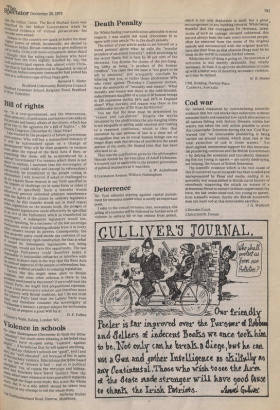1111 1 of rights "It is over- g overnment, and the intervention, arbitrary,
of politicians and bureaucrats alike in "le Private and family affairs of the citizen, which has f,iverl rise to the agitation for a Bill of Rights." — Mr atrick Cosgrave (December 6). Hear! Hear! . tarn worried by the prospects of future government 1.11tervention. Who will buy a nationalised industry if It wt. 111 be nationalised again on a change of
government? Who will let their property to tenants even after the repeal of the Rent Acts if they, or
• Sornething like them, will be re-introduced by a Labour Government? For reasons which there is not ce to explain, I maintain that the sovereignty of n, !lament could validly and (except by referendum) 'evocably be transferred to the people voting in referendum. I will, however, if asked or challenged to de SO, explain those reasons in any form specified in the n request or challenge (or in some form or other if e-ff°,,rie*, is so specified). Such a transfer would t_hczeely prevent unlimited arbitrary interference rights of the citizen by ordinary legislative Process. As this transfer would not in itself repeal er legislation on the statute book, the povAers of nrsequent legislatures could effectively be specified Zan Act of the Parliament which so transferred its vereigntY. A subsequent legislature would not, strictly sneaking, be a successor of the last sovereign ernent, even if indistinguishable from it in every sirskner respect except its powers. Consequently, the els.s. majority party could decide the contents of our it comparatively rigid constitution, for that is what sov‘voukt be. Subsequent legislatures, not being
ereign, would not have this opportunity. The last --vere• Ign Parliament could therefore make it
p-rrssible to nationalise industries or interfere with O Le:t,y in peace-time in the way that the Rent Acts d'nent approval of the people in referendum; but, .resired, without prejudice to existing legislation. tre.eties like this might seem alien to British
ItI°n. but what other solution is there to the
°Nem . . .
Liber mentioned in this letter? If we could trust the
tati a PartY, we might find proportional represenin hon. a less provocative solution and therefore more the ar.Irli °nY with British tradition; but I do not trust less,—lueral Party (and trust the Labour Party even pari? and therefore consider the sovereignty of b laMent a menace: a proper subject for euthanasia Ut let us prepare a good Will for it. 5 Quee D. E..Folites . n's Walk, Ealing, London W5


































 Previous page
Previous page